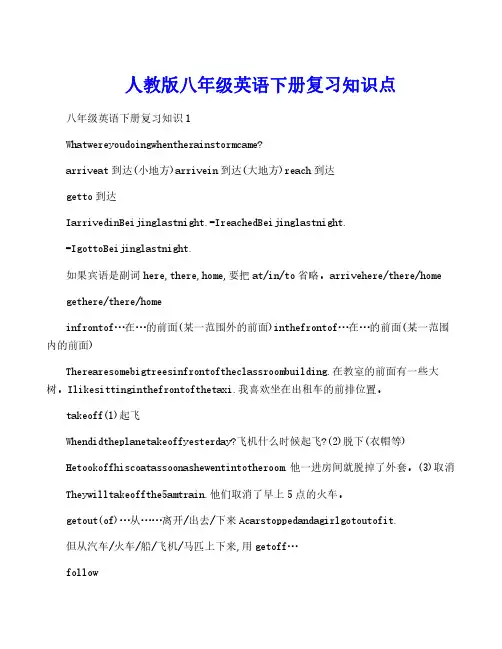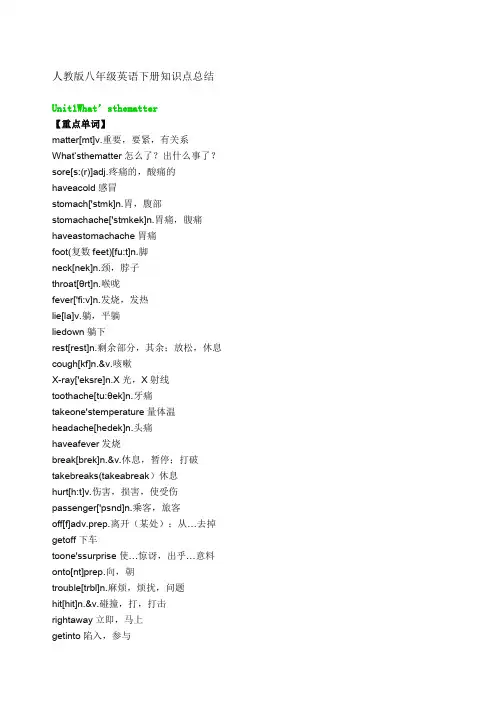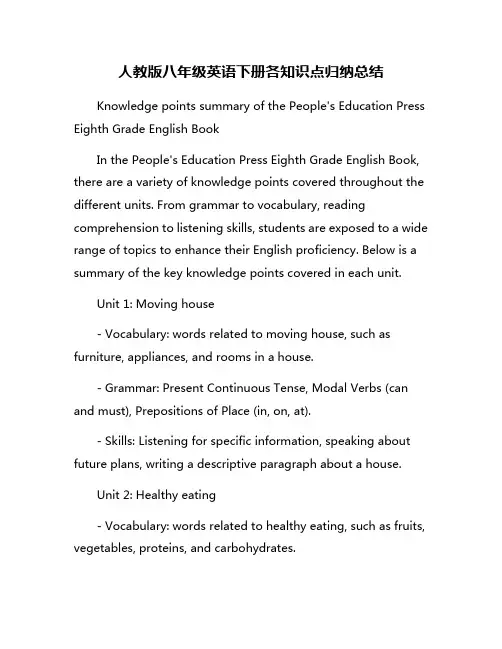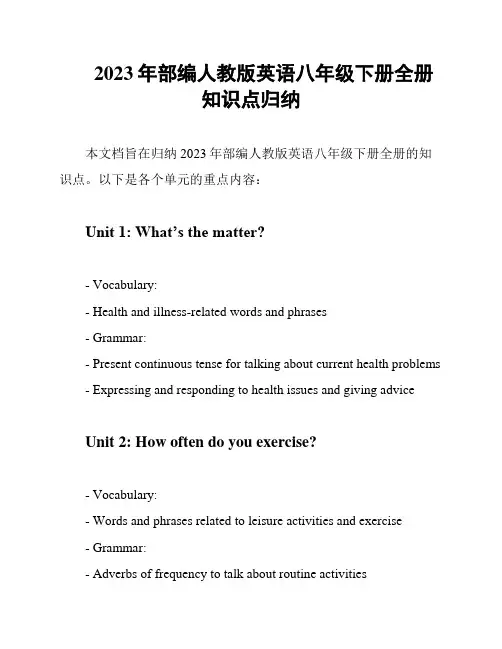人教版八年级英语下册各知识点整理
人教版八年级下册英语知识点归纳总结

千里之行,始于足下。
人教版八年级下册英语知识点归纳总结八年级下册英语知识点归纳总结:1. 时态:包括一般现在时、一般过去时、一般将来时、现在进行时等。
2. 名词:包括可数名词和不可数名词的用法,以及名词的复数形式的构成规则。
3. 代词:包括人称代词、物主代词、反身代词、不定代词的用法及其形式变化。
4. 冠词:包括定冠词和不定冠词的用法及其形式变化。
5. 数词:包括基数词、序数词、分数词的用法。
6. 动词:包括动词的基本用法、不同类型动词的变化规则、动词时态和语态的变化等。
7. 形容词和副词:包括形容词和副词的基本用法、比较级和最高级的构成规则等。
8. 介词:包括介词的基本用法、常用的介词短语等。
9. 连词:包括并列连词、从属连词的用法及其区别。
10. 状语从句和定语从句:包括状语从句和定语从句的引导词、结构和用法。
11. 感叹句和祈使句:包括感叹句和祈使句的基本用法和句型结构。
12. 时态和语态的混合运用:包括时态和语态的混合运用,以及在不同句子结构中的变化。
13. 直接引语和间接引语:包括直接引语和间接引语的转换和用法。
14. 一般疑问句和特殊疑问句:包括一般疑问句和特殊疑问句的句型结构和用法。
15. 简单句和复合句的转换:包括把简单句转换为复合句,以及复合句的主从句关系和连接词的运用。
16. 非谓语动词的用法:包括动名词、不定式和分词的用法。
第1页/共2页锲而不舍,金石可镂。
17. 阅读理解技巧:包括提取关键信息、推理判断以及对文章的主旨和细节的理解。
以上是八年级下册英语的主要知识点归纳总结,希望对你有帮助。
人教版八年级英语下册复习知识点

人教版八年级英语下册复习知识点八年级英语下册复习知识1Whatwereyoudoingwhentherainstormcame?arriveat到达(小地方)arrivein到达(大地方)reach到达getto到达IarrivedinBeijinglastnight.=IreachedBeijinglastnight.=IgottoBeijinglastnight.如果宾语是副词here,there,home,要把at/in/to省略。
arrivehere/there/homegethere/there/homeinfrontof…在…的前面(某一范围外的前面)inthefrontof…在…的前面(某一范围内的前面)Therearesomebigtreesinfrontoftheclassroombuilding.在教室的前面有一些大树。
Ilikesittinginthefrontofthetaxi.我喜欢坐在出租车的前排位置。
takeoff(1)起飞Whendidtheplanetakeoffyesterday?飞机什么时候起飞?(2)脱下(衣帽等)Hetookoffhiscoatassoonashewentintotheroom.他一进房间就脱掉了外套。
(3)取消Theywilltakeoffthe5amtrain.他们取消了早上5点的火车。
getout(of)…从……离开/出去/下来Acarstoppedandagirlgotoutofit.但从汽车/火车/船/飞机/马匹上下来,用getoff…follow跟随Ifollowedhimuphehill.我跟着他上了山.沿着……前进Followthisroaduntilyougettothepostoffice.顺着这条路一直到邮局.(3)听懂,理解Couldyouspeakmoreslowly?Ican’tfollowyou.你能说慢点吗?我听不(4)followsb.todosth.跟着某人做某事Pleasefollowmetoreadthestory.请跟我读这个。
人教版八年级英语下册知识点总结

人教版八年级英语下册知识点总结Unit1What’sthematter【重点单词】matter[mt]v.重要,要紧,有关系What’sthematter怎么了?出什么事了?sore[s:(r)]adj.疼痛的,酸痛的haveacold感冒stomach['stmk]n.胃,腹部stomachache['stmkek]n.胃痛,腹痛haveastomachache胃痛foot(复数feet)[fu:t]n.脚neck[nek]n.颈,脖子throat[θrt]n.喉咙fever['fi:v]n.发烧,发热lie[la]v.躺,平躺liedown躺下rest[rest]n.剩余部分,其余;放松,休息cough[kf]n.&v.咳嗽X-ray['eksre]n.X光,X射线toothache[tu:θek]n.牙痛takeone'stemperature量体温headache[hedek]n.头痛haveafever发烧break[brek]n.&v.休息,暂停;打破takebreaks(takeabreak)休息hurt[h:t]v.伤害,损害,使受伤passenger['psnd]n.乘客,旅客off[f]adv.prep.离开(某处);从…去掉getoff下车toone'ssurprise使…惊讶,出乎…意料onto[nt]prep.向,朝trouble[trbl]n.麻烦,烦扰,问题hit[hit]n.&v.碰撞,打,打击rightaway立即,马上getinto陷入,参与herself[h:self]pron.她自己,她本身(she的反身代词)bandage['bndd]n.&v.绷带;用绷带包扎sick[sk]adj.患病的,不适的knee[ni:]n.膝盖nosebleed[nzbli:d]n.鼻出血breathe[bri:e]v.呼吸sunburned[snb:nd]adj.晒伤的ourselves[ɑ:selvz]pron.我们自己(we的反身代词)climber[klam(r)]n.登山者beusedto习惯于…适应于…risk[rsk]n.&v.风险,危险;冒险takerisks(takearisk)冒险accident[ksidnt]n.意外事件;事故situation[sitjuein]n.状况,形式,情况kg=kilogram[klgrm]n.公斤,千克rock[rk]n.岩石runout(of)用尽,耗尽knife[naif]n.刀,餐刀cutoff切除blood[bld]n.血mean[mi:n]v.意味着,意思是,意欲getoutof离开,从…出来importance[mp:tns]n.重要性decision[d'sn]n.决心,决定,抉择control[kn'trl]v.控制,支配,操纵beincontrolof掌管,管理spirit['sprt]n.勇气,意志death[deθ]n.死亡giveup放弃nurse[n:s]n.护士【重点短语】1.haveafever发烧2.haveacough咳嗽3.haveatoothache牙疼4.talktoomuch说得太多5.drinkenoughwater喝足够的水6.haveacold受凉;感冒7.haveastomachache胃疼8.haveasoreback背疼9.haveasorethroat喉咙痛10.takerisks冒险11.hotteawithhoney加蜂蜜的热茶12.seeadentist看牙医13.getanX-ray拍X光片14.takeone’stemperature量体温15.putsomemedicineonsth.在……上面敷药16.giveup放弃17.soundlike听起来像18.allweekend整个周末19.inthesameway以同样的方式20.gotoadoctor看医生21.goalong沿着……走22.onthesideoftheroad在马路边23.shoutforhelp大声呼救24.withoutthinkingtwice没有多想25.getoff下车26.haveaheartproblem有心脏病27.toone’ssurprise另某人惊讶的是28.thanksto多亏了;由于29.intime及时30.makeadecision做出决定31.getintotrouble造成麻烦32.rightaway立刻;马上33.becauseof由于34.getoutof离开;从……出来35.keepondoingsth.继续或坚持做某事36.putabandageonsth.用绷带包扎37.falldown摔倒38.feelsick感到恶心39.haveanosebleed流鼻血40.cuthisknee割伤他的膝盖41.putherheadback把她的头向后仰42.haveproblemsbreathing呼吸困难43.mountainclimbing登山运动44.beusedtodoingsth.习惯做某事45.runout(of)用完;用尽46.sothat以便47.so...that...如此……以至于...…48.beincontrolof掌管;管理49.inadifficultsituation在闲境中【重点句型】1.What'sthematterwithyou=What'thetroublewithyou=What'swrongwithyou你怎么了?2.Whatshouldshedo她该怎么办呢?3.ShouldItakemytemperature我应该量一下体温吗?4.Youshouldliedownandrest.你应该躺下休息一会儿。
人教版八年级英语下册各知识点归纳总结

人教版八年级英语下册各知识点归纳总结Knowledge Summary of People's Education Edition Eighth Grade English TextbookUnit 1 Dream JobsIn this unit, students learn about different occupations and career paths. They practice talking about their dream jobs and discussing the pros and cons of different professions. Vocabulary includes words related to jobs, such as lawyer, engineer, chef, etc. Grammar points include the present simple tense for expressing routines and habits, as well as future forms for talking about future plans.Unit 2 Healthy EatingThis unit focuses on the importance of a balanced diet and healthy eating habits. Students learn about different food groups, nutrients, and the benefits of eating a variety of foods. Vocabulary includes words related to food, such as carbohydrates, proteins, vitamins, etc. Grammar points include using countable and uncountable nouns, as well as quantifiers such as some, any, much, and many.Unit 3 Travel PlansIn this unit, students learn how to talk about their travel plans and experiences. They practice using travel vocabulary and expressions, as well as giving recommendations for places to visit. Vocabulary includes words related to travel, such as destination, itinerary, accommodation, etc. Grammar points include present perfect tense for talking about past experiences and future forms for making predictions and plans.Unit 4 Environmental ProtectionThis unit focuses on the importance of protecting the environment and taking action to preserve natural resources. Students learn about environmental issues and discuss ways to reduce waste and pollution. Vocabulary includes words related to the environment, such as recycling, renewable energy, pollution, etc. Grammar points include modals of obligation and necessity for giving advice and making suggestions.Unit 5 Festivals around the WorldIn this unit, students learn about different festivals and celebrations from around the world. They practice talking about cultural traditions, customs, and rituals. Vocabulary includes words related to festivals, such as celebrations, traditions, customs, etc. Grammar points include using the present perfecttense to talk about past experiences and cultural differences in expressing gratitude and apologies.Overall, the eighth grade English textbook covers a wide range of topics and language skills, including vocabulary, grammar, speaking, listening, reading, and writing. Students are exposed to a variety of real-life situations and authentic materials to help them develop their language proficiency and communication skills. By the end of the school year, students should feel more confident and competent in using English in different contexts and situations.。
人教版八年级英语下册各知识点归纳总结

人教版八年级英语下册各知识点归纳总结Knowledge points summary of the People's Education Press Eighth Grade English BookIn the People's Education Press Eighth Grade English Book, there are a variety of knowledge points covered throughout the different units. From grammar to vocabulary, reading comprehension to listening skills, students are exposed to a wide range of topics to enhance their English proficiency. Below is a summary of the key knowledge points covered in each unit.Unit 1: Moving house- Vocabulary: words related to moving house, such as furniture, appliances, and rooms in a house.- Grammar: Present Continuous Tense, Modal Verbs (can and must), Prepositions of Place (in, on, at).- Skills: Listening for specific information, speaking about future plans, writing a descriptive paragraph about a house.Unit 2: Healthy eating- Vocabulary: words related to healthy eating, such as fruits, vegetables, proteins, and carbohydrates.- Grammar: Imperatives, Countable and Uncountable Nouns, How much/How many questions.- Skills: Reading for main ideas, discussing healthy eating habits, writing a persuasive essay about the importance of a balanced diet.Unit 3: Communication- Vocabulary: words related to communication, such as email, phone call, text message, and face-to-face conversation.- Grammar: Present Simple Tense, Affirmative, Negative, and Interrogative sentences, Direct and Indirect Speech.- Skills: Listening for details, role-playing different communication scenarios, writing a formal email to a friend.Unit 4: Wildlife protection- Vocabulary: words related to wildlife protection, such as endangered species, habitat loss, poaching, and conservation efforts.- Grammar: Comparative and Superlative Adjectives, Reported Speech, Modals of Advice (should, ought to).- Skills: Reading for inference, discussing environmental issues, writing an argumentative essay on the importance of wildlife conservation.Unit 5: Making a difference- Vocabulary: words related to social issues, such as poverty, education, healthcare, and volunteer work.- Grammar: Present Perfect Tense, Passive Voice, Conditional Sentences (If clauses).- Skills: Listening for opinions, debating social problems, writing a speech about making a difference in the community.Unit 6: Cultural differences- Vocabulary: words related to cultural differences, such as customs, traditions, beliefs, and festivals.- Grammar: Past Simple Tense, Reported Speech (Statements with reporting verbs).- Skills: Reading for inference, comparing cultural practices, writing a diary entry about a cultural exchange experience.Overall, the People's Education Press Eighth Grade English Book provides a comprehensive overview of essential English language skills and knowledge points. By mastering theseconcepts, students will be able to communicate effectively in a variety of real-life situations and develop a deeper understanding of the English language and culture.。
2023年部编人教版英语八年级下册全册知识点归纳

2023年部编人教版英语八年级下册全册知识点归纳本文档旨在归纳2023年部编人教版英语八年级下册全册的知识点。
以下是各个单元的重点内容:Unit 1: What’s the matter?- Vocabulary:- Health and illness-related words and phrases- Grammar:- Present continuous tense for talking about current health problems - Expressing and responding to health issues and giving adviceUnit 2: How often do you exercise?- Vocabulary:- Words and phrases related to leisure activities and exercise- Grammar:- Adverbs of frequency to talk about routine activities- Present simple tense for making generalizations- Discussing exercise routines and habitsUnit 3: Why don’t you get her a scarf?- Vocabulary:- Words and phrases related to gifts and shopping- Grammar:- Imperatives for making suggestionsUnit 4: I want to be an actor.- Vocabulary:- Words and phrases related to professions and aspirations- Grammar:- Future plans using "want to" and "going to"- Talking about future goals and aspirationsUnit 5: What were you doing when the rainstorm came?- Vocabulary:- Words and phrases related to past activities and weather events- Grammar:- Past continuous tense for talking about interrupted activities- Describing past events and experiencesUnit 6: Do you like bananas?- Vocabulary:- Words and phrases related to food preferences and dietary habits- Grammar:- Questions and short answers for asking about preferences- Expressing likes and dislikes以上是2023年部编人教版英语八年级下册全册的知识点归纳。
人教版八年级下册英语必考知识点梳理(期末复习必备)
人教版八年级下册英语必考知识点梳理(期末复习必备)八年级下册英语知识点Unit 1 What’s the matter?【重点短语】1.have a fever 发烧2.have a cough 咳嗽3.have a toothache 牙疼4.talk too much 说得太多5.drink enough water 喝足够的水6.have a cold 受凉;感冒7.have a stomachache 胃疼8.have a sore back 背疼9.have a sore throat 喉咙痛10. take risks 冒险11.hot tea with honey 加蜂蜜的热茶12.see a dentist 看牙医13.get an X-ray 拍X 光片14.take one’s temperature 量体温15.put some medicine on sth. 在……上面敷药16. give up 放弃17. sound like 听起来像18. all weekend 整个周末19. in the same way 以同样的方式20. go to a doctor 看医生21. go along 沿着……走22. on the side of the road 在马路边23. shout for help 大声呼救24. without thinking twice 没有多想25. get off 下车26. have a heart problem 有心脏病27. to one’s surprise 另某人惊讶的是28. thanks to 多亏了;由于29. in time 及时30. make a decision 做出决定31. get into trouble 造成麻烦32. right away 立刻;马上33. because of 由于34. get out of 离开;从……出来35. keep on doing sth. 继续或坚持做某事36. put a bandage on sth. 用绷带包扎37. fall down 摔倒38. feel sick 感到恶心39. have a nosebleed 流鼻血40. cut his knee 割伤他的膝盖41. put her head back 把她的头向后仰42. have problems breathing 呼吸困难43. mountain climbing 登山运动44. be used to doing sth. 习惯做某事45. run out (of) 用完;用尽46. so that 以便47. so...that... 如此……以至于...…48. be in control of 掌管;管理49. in a difficult situation 在闲境中【重点句型】1. What's the matter with you?= What'the trouble with you? = What's wrong with you? 你怎么了?2. What should she do? 她该怎么办呢?3.Should I take my temperature? 我应该量一下体温吗?4.You should lie down and rest. 你应该躺下休息一会儿。
人教版八年级英语下册各知识点归纳总结
人教版八年级英语下册各知识点归纳总结The following is a comprehensive summary of various knowledge points covered in the eighth-grade English textbook of People's Education Press, Volume 2.Unit 1: Ways of Learning1.1 Vocabulary and Expressions- Key vocabulary related to learning methods, such as memorize, underline, and summarize.- Expressions used to give opinions, like in my opinion, I believe, and from my point of view.1.2 Grammar- Present simple tense: affirmative, negative, and interrogative forms.- Adverbs of frequency: always, usually, often, sometimes, seldom, rarely, never.- Time expressions: every day/week/month/year, on weekdays/weekends, in the morning/afternoon/evening.1.3 Reading Skills- Skimming: quickly reading a text to get the main idea.- Scanning: searching for specific information within a text.- Understanding context clues to infer the meaning of unfamiliar words.Unit 2: Growing Pains2.1 Vocabulary and Expressions- Vocabulary related to adolescence, such as teenager, peer pressure, and independence.- Expressions used to express feelings, like I'm overwhelmed, I feel stressed, and I can't stand it.2.2 Grammar- Present continuous tense: affirmative, negative, and interrogative forms.- Future forms: will/won't, going to, and present continuous for future arrangements.- Comparative and superlative forms of adjectives.2.3 Reading Skills- Identifying the main idea in a paragraph or passage.- Inferring the meaning of words from their context.- Understanding explicit and implicit information.Unit 3: At the Water's Edge3.1 Vocabulary and Expressions- Vocabulary related to water sports and activities, such as snorkeling, surfing, and sailing.- Expressions used to talk about preferences, like I'd rather, I prefer, and I'm interested in.3.2 Grammar- Past simple tense: regular and irregular verbs in affirmative, negative, and interrogative forms.- Past continuous tense: affirmative, negative, and interrogative forms.- Modal verbs: can, could, may, might for permission, possibility, and uncertainty.3.3 Reading Skills- Recognizing different text types, such as descriptive, narrative, and informative texts.- Understanding cause and effect relationships.- Making inferences based on the information provided in the text.Unit 4: Our World4.1 Vocabulary and Expressions- Vocabulary related to environmental issues, such as pollution, deforestation, and recycling.- Expressions used to describe the environment, like polluted, endangered, and sustainable.4.2 Grammar- Present perfect tense: affirmative, negative, and interrogative forms.- Articles: definite and indefinite articles (a, an, the).- Conditional sentences: zero and first conditional.4.3 Reading Skills- Understanding details, facts, and opinions in a text.- Recognizing the author's purpose and point of view.- Making connections between different texts or ideas.Note: This summary provides an overview of the various knowledge points covered in each unit of the People's Education Press eighth-grade English textbook. For detailed explanations, examples, and exercises, please refer to the corresponding sections in the textbook.。
人教版八年级英语下册复习知识点
人教版八年级英语下册复习知识点八年级英语下册复习知识1What were you doing when the rainstorm came?1. arrive at 到达(小地方)arrive in到达(大地方)reach 到达get to 到达I arrived in Beijing last night. = I reached Beijing last night .= I got to Beijing last night .如果宾语是副词here, there, home, 要把at/in/to省略。
arrive here/there/homeget here/there/home2. in front of… 在… 的前面 (某一范围外的前面)in the front of … 在… 的前面(某一范围内的前面)There are some big trees in front of the classroom building. 在教室的前面有一些大树。
I like sitting in the front of the taxi. 我喜欢坐在出租车的前排位置。
3. take off(1)起飞When did the plane take off yesterday? 飞机什么时候起飞?(2)脱下(衣帽等)He took off his coat as soon as he went into the room. 他一进房间就脱掉了外套。
(3)取消They will take off the 5 am train . 他们取消了早上5点的火车。
4. get out (of ) … 从……离开/出去/下来A car stopped and a girl got out of it.但从汽车/火车/船/飞机/马匹上下来, 用get off…5. follow(1)跟随 I followed him up he hill. 我跟着他上了山.(2)沿着……前进 Follow this road until you get to the post office. 顺着这条路一直到邮局.(3)听懂,理解Could you speak more slowly? I can’t follow you. 你能说慢点吗?我听不懂。
人教版八年级英语下册各单元知识点
人教版八年级英语下册各单元知识点Unit 1 Making a DifferenceVocabulary- volunteer 志愿者- charity 慈善- donation 捐赠- organization 组织- foundation 基金会- orphan 孤儿Grammar- Simple present tense 简单现在时- Imperatives 祈使句- Adverbs of frequency 频度副词Unit 2 RobotsVocabulary- robot 机器人- artificial intelligence 人工智能- function 功能- task 任务- instruction 指令Grammar- Future tense 将来时- Conditional sentences 条件句- Infinitives 动词不定式Unit 3 Ancient Civilizations Vocabulary- civilization 文明- monument 纪念碑- emperor 皇帝- dynasty 朝代- pyramid 金字塔- tomb 坟墓Grammar- Past continuous tense 过去进行时- Time clauses 时间从句- Passive voice 被动语态Unit 4 Our WorldVocabulary- pollution 污染- environment 环境- recycle 回收利用- eco-friendly 环保的- global warming 全球变暖- ecology 生态学Grammar- Present continuous tense 现在进行时- Adjectives and adverbs 形容词和副词- Indefinite pronouns 不定代词Unit 5 MusicVocabulary- melody 旋律- instrument 乐器- rhythm 节奏- lyrics 歌词- choir 合唱团Grammar- Present perfect tense 现在完成时- Adverbial clauses 状语从句- Infinitives 动词不定式Unit 6 I'm more outgoing than my sister Vocabulary- outgoing 外向的- shy 害羞的- confident 自信的- impatient 不耐烦的- independent 独立的- reliable 可靠的Grammar- Present perfect tense 现在完成时- Noun clauses 名词从句。
- 1、下载文档前请自行甄别文档内容的完整性,平台不提供额外的编辑、内容补充、找答案等附加服务。
- 2、"仅部分预览"的文档,不可在线预览部分如存在完整性等问题,可反馈申请退款(可完整预览的文档不适用该条件!)。
- 3、如文档侵犯您的权益,请联系客服反馈,我们会尽快为您处理(人工客服工作时间:9:00-18:30)。
复习资料 人教版八年级英语下册 各知识点归纳总结
Unti1 what’s the matter? 短语归纳 1.too much 太多 2.lie down 躺下 3.get an X-ray 做个X光检查 4.take one ’s temperature 量体温 5.put some medicine on ......在....上敷药 6.have a fever 发烧 7.take breaks /take a break 休息 8.without thinking twice 没多想 9.get off 下车 10.take sb to the hospital 送某人去医院 11.wait for等待 12.to one’s surprise 使.......惊讶的 13.thanks to多亏于;由于 14.in time及时 15.think about 考虑 16.have a heart problem患有心脏病 17.get into the trouble 遇到麻烦 18.do the right thing做正确的事情事情 19.fall down 摔倒 20.put ...... on sth把...放在某物上 21.get hit/sunburned 摔伤/烧伤 22.be interested in 对.....感兴趣 23.be used to 习惯于.... 24.take risks/take a risk 挑战 25.lose one’s life 失去生命 26.because of 因为 27.run out of 用完 28.cut off 切除 29.get out of 从...出来 30.make a decision/decisions 做决定 31.be in control of 掌管;管理 32.give up 放弃 用法归纳 1.need to do sth .需要去做某事 2.see sb doing sth 看见某人正在做某事 3.ask sb sth 询问某人某事 4.expect sb to do sth 期望某人做某事 5.agree to do sth 同意做某事 6.help sb (to) do sth 帮助某人做某事 7.want to do sth 想要做某事 8.tell sb to do sth 告诉某人做某事 9.have problems(in) doing sth 做某事有困难 10.use sth to do sth用某物去做某事 复习资料 11.be/get used to doing sth 习惯于做某事 12.seem to do sth 好像做某事 13.keep on doing sth 继续做某事 14.mind doing sth 介意做某事 语法点 1.询问某人的健康问题及遇到麻烦的表达方法 2.情态动词should的用法 3.不定代词的用法 精细解读 1. What’s the matter (with you)? 怎么了?出什么事了? What’s the trouble/ the problem / wrong with sb./ sth.? 2. I had a cold.我感冒了。 have a cold=catch a cold=have the flu感冒 have a fever发烧 have a cough咳嗽 have a stomachache胃疼,肚子疼 have a toothache牙疼 have a headache头疼 3. 身体部位+ache(疼痛)构成新的复合词 stomach+ache=stomachache head+ache=headache tooth+ache=toothache back+ache=backache后背痛 4. much too+形容词或副词,意为太。。。,too much+不可数名词,意为太多。。。。 5. enough【形容、副词】足够的/地,enough放在名词后,形副后。 good enough足够好,enough money足够的钱 6. lie down躺下, lie 躺,躺着,过去式lay;lie说谎,过去式lied 7. maybe “或许”,常用于句首,表示可能性,后加句子。Maybe you are right. may be,是情态动词+be的结构,意为“可能,也许”,后加名词、代词或形容词。He may be angry. 8. sound like+名词代词和从句:It sounds like you don’t know the truth. It sounds like a good idea. sound+形容词,“听起来,好像”,The music sounds nice. 9. need 需要,实义动词need+名词,需要某物; need to do sth.需要做某事,主语通常是人,表示人主动的动作:You need to listen carefully during class. need doing sth.主语通常是物,表示被动的动作:Your dirty clothes need washing. 10. get off (the bus) 下(公交车) get on 上车 11. agree 同意,赞同;同意做某事agree to do ,同意某人的看法、观点agree with sb。 12. trouble问题,麻烦 ;be in trouble 陷入困境,make trouble 制造麻烦 ,have trouble (in) doing sth. =have difficulties (in) doing sth 做某事有困难 。 13. right away=right now=at once,意为 立刻,马上 。 复习资料 14. run out用完,用尽 When his water run out, he knew that he would have to do something to save his own life. 物sth. run out. 某物用尽了。 人sb. run out of sth..人用尽了某物。He run out of all his money last night. 15. risk (sb.) to do sth. 冒险去做某事 take a risk=take risks 冒险 16. the importance of (doing) sth.(做)某事的重要性 We students should know the importance of (learning) English. importance n. 重要(性), important adj.重要的,unimportant adj.不重要的 17. decision 【名词】决定;抉择; make a decision 做决定 18. be in the control of …掌管,管理 The headmaster is in the control of this new school. be out of control无法控制,无法管理
重点语法 【反身代词】英语中共有八个反身代词,在使用时应注意和它所指的相应的对象在人称、性别、数上保持一致。 数 人称 第一人称 第二人称 第三人称
单数 myself yourself himself herself itself
复数 ourselves yourselves themselves
用在某些固定短语当中。 如: look after oneself / take care of oneself 照顾自己 teach oneself sth./ learn sth. by oneself自学 enjoy oneself 玩得高兴,过得愉快 help oneself to sth 请自用……(随便吃/喝些……). hurt oneself摔伤自己 say to oneself自言自语 leave sb. by oneself把某人单独留下 buy oneself sth.给自己买……东西 introduce oneself 介绍……自己 【提醒】 1. 反身代词不能单独做主语,但可以做主语的同位语,起强调作用。 如:我自己能完成作业。 (误)Myself can finish my homework. (正) I myself can finish my homework. / I can finish my homework myself. 2. 反身代词表示“某人自己”不能表示“某人的东西”,因为它没有所有格的形式。表达“某人自己的(东西)”时,须要用one’s own. 如:我用我自己的蜡笔画画。(误)I’m drawing with myself crayons. (正) I’m drawing with my own crayons. 【练习】 复习资料 1. My classmate, Li Ming, made a card for _________ just now. 2. Bad luck! I cut _________ with a knife yesterday. 3. They tell us they can look after_________ very well. 4. My cat can find food by_________ . 5. Help __________to some beef, boys. 6. Jenny enjoyed_________ in the park yesterday afternoon. 7. We can finish our homework by_________ . 8. The blind girl lost_________ in the beautiful music. 9. Xiao Hui, can you introduce _________ to us ? 10. Bill wants to teach_________ French from now on.
Unit 2 I’ll help to clean the city parks 短语归纳 1.clean up 打扫干净 2.cheer up (使)变得更高兴;振奋起来 3.give out 分发 4. used to 曾经......;过去........ 5.give away 赠送;捐赠 6.set up 建立;设立 7.make a difference有作为 8.come up with 想出 9.put off 推迟 10.put up 张贴 11.call up 打电话给 12.help out 帮助.....摆脱困难 13.care for 照顾;照看 14.give up 放弃 15.try out for 参加选拔 16.come true 实现 17.run out of 用光 18.take after 与.....相像 19.fix up 修理 20.be similiar to 与......相似 用法归纳 1.need to do sth 需要做某事 2.make plan to do sth 制定计划做某事 3.ask sb (not ) to do sth 要求某人(不要)做某事 4.used to do sth 过去常常做某事 5.decide to do sth 决定做某事 6.help sb (to)do sth 帮助某人做某事 7.make a difference to 对......产生影响 8.make it possible for sb to do sth 使得做某事对某人来说是可能的 拓展链接 动词+副词 短语
